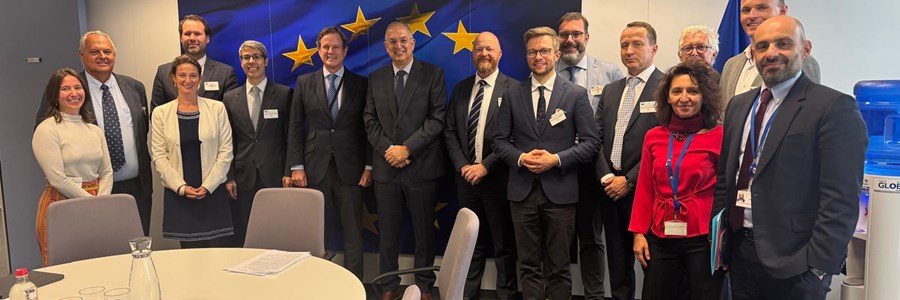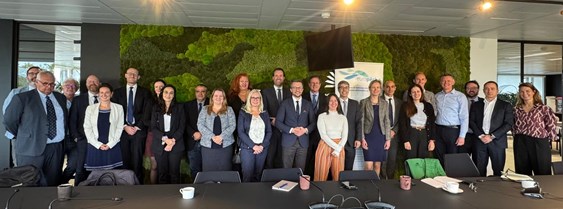Urgent call for fair funding, balanced management and sustainable trade rules

Europêche, the representative body of the EU fishing industry, held high-level meetings last Friday with Commissioner Kadis and Fisheries Attachés from 12 Member States, under the Danish Presidency, to discuss the critical challenges ahead for European fisheries. The dialogue took place against the backdrop of decisive policy discussions on the future EU budget (2028–2034), fishing opportunities for 2026, ongoing negotiations with third countries, and the implementation of new control measures and trade agreements.
EU Budget 2028–2034: a non-starter without a reinforced specific fund for fisheries
Europêche expressed deep disappointment at the European Commission’s proposal for the next Multiannual Financial Framework (MFF), which foresees a 67% cut in ring-fenced funding for fisheries, reducing the allocation to just €2 billion.
‘This proposal is inconsistent with the EU’s stated priorities on competitiveness, resilience and food security,’ said Javier Garat, President of Europêche. ‘The Common Fisheries Policy is one of the few fully European policies. To strip it of a fully-fledge fund is not just inconsistent – it ultimately dismantles the very policy itself.”
The sector raised concerns about the merger of fisheries financing into wider macro-funds, exposing operators to competition with larger industries. Maximum aid intensity rates will also be completely left on the hands of Member States, which is bound to create distortions and unfair competition within the common market. Europêche appreciated the constructive talks held with the Commissioner and Member States aimed at finding ways to ensure that funding for fisheries is safeguarded at no less than the present level.
This support is vital for fishers to continue investing in new technologies, ensuring safer and better working conditions, attracting new talent to the profession, leading the transition to a low-carbon future and staying competitive in global markets.
Fishing opportunities for 2026: progress recognised, but zero-TAC advice threatens communities
While welcoming the Commission’s latest communication acknowledging the good management of EU stocks, Europêche voiced serious concerns over zero-catch proposals and poor data categories.
- Baltic Sea: Europêche recalled that the current regime shifts stems from environmental pressures (pollution, predation by seals and cormorants, oxygen depletion), not fishing. Therefore, further reductions in bycatch quotas appear to be more symbolic than effective and would force many fishing companies to shut down. Europêche thus urged to maintain bycatch quotas for cod and herring and to adopt effective management measures for seals and cormorants.
- Mediterranean: The sector highlighted the significant progress made through reduced fishing effort (>40%) and strict management measures. Europêche called on EU policy-makers to grant additional fishing days as a reward for these sacrifices and to remove Mediterranean red shrimp from the quota system.
- North-East Atlantic: Europêche, echoed EU Advisory Councils recommendations stressing that ICES advice continues to be overly precautionary, with many stock assessments still based on limited data and precautionary assumptions that unfairly penalise the sector. In addition, zero-TAC proposals for cod, haddock, and whiting would have devastating consequences for coastal communities. Europêche urged EU policy-makers to move away from zero-catch approaches, maintain bycatch quotas, and factor in socio-economic impacts when setting quotas for key species to soften the severity of proposed cuts.

Europêche raises the alarm on EU–UK–Norway and international fisheries talks
Europêche reaffirmed its commitment to cooperation with the UK and welcomed the 12-year extension of reciprocal fishing access until 2038. However, the organisation warned that new restrictions risk turning this agreement into empty words. In particular, recently adopted marine protected areas (MPAs) in Scottish waters and Stage 3 MPA proposals will force many vessels out of UK waters. Europêche considers many of these closures unjustified, disproportionate and discriminatory since European vessels will suffer nearly five times greater economic losses compared to UK vessels operating in the same areas. On top of this, the closure of the sandeel fishery—still in place despite a favourable arbitration ruling—is damaging the fleet. Europêche urged both sides to find political solutions and adopt mitigation measures to safeguard EU fishing communities.
On the wider stage, Europêche voiced strong concerns over the poor state of key pelagic stocks such as mackerel, herring, and blue whiting— following years of overfishing by other Coastal States, such as Norway, Russia and Faeroe Islands. The organisation called on the Commission to take a tougher line: secure fair and sustainable sharing arrangements through high-level diplomacy and by applying market pressure and targeted trade measures against unsustainable practices. In the meantime, Europêche insists that EU and national authorities must clearly explain that proposed catch limits (TACs) are based on scientific advice and therefore sustainable. Consumers, retailers, and the market at large must continue to trust, sell and eat EU-caught mackerel since it remains a sustainable choice.
Fisheries Control Regulation: improvements welcome, but weighing rules unacceptable
The sector acknowledged progress on the implementation of the Control Regulation following Commission engagement and adjustments to address stakeholder concerns. However, Europêche warned that proposed weighing rules remains unacceptable and regrets that adopted derogations on margin of tolerance remain unapplicable in practice. Europêche appreciated constructive dialogue with Commissioner Kadis and his cabinet to develop workable solutions at technical level.
Competitiveness Compass: call for an omnibus proposal
Europêche welcomed the Commission’s push to simplify EU rules—but warned the big EU strategies and the Common Fisheries Policy (CFP) revision is moving far too slowly, with no real impact expected before 2030. The sector called for an urgent omnibus proposal to cut red tape and simplify fisheries rules, highlighting that the farming sector has already enjoyed fast-tracked reforms. All sides agreed to continue working on concrete proposals.
Free Trade Agreements: open markets cannot mean unfair competition
In her State of the Union address, President von der Leyen highlighted that fishers are facing ‘high input costs, red tape and unfair competition’. Inspiring words — yet, in practice, new FTAs with Indonesia and Thailand will allow low-standard duty-free tuna imports. Europêche called for its exclusion or impose strict origin rules.
Under the new EU-US deal, the EU faces a 15% tariff on its seafood exports to the USA, while thousands of tonnes of American seafood, enter the EU market tariff-free. This imbalance has hit European companies hard and created zero business opportunities for EU seafood exports. The sector urged to seek tariff derogations for EU seafood products in the next round of negotiations.
END
Press Contact:
Daniel Voces, Managing Director of Europêche
Email: daniel.voces@europeche.org │ Phone: +32 489 26 81 07
Sources: Europeche
Attachments:
Tags: Commissioner Kadis, Member States, Fisheries Attachés, Danish Presidency, MFF, TAC, quotas, FTA, competitiveness, control